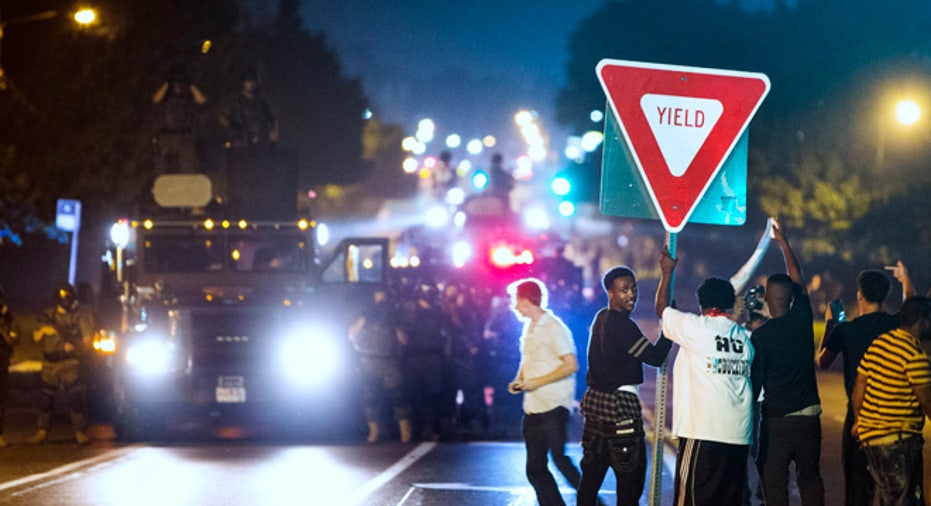Will Ferguson’s Business Community Recover from Riots, Lootings?

The fatal shooting of unarmed 18-year-old Michael Brown in Ferguson, Mo. by a police officer has rocked the working-class city, setting off protests, riots and lootings that have damaged more than 30 businesses.
Brown was killed on August 9 and in the days since racial tensions have hit a fever pitch, with MRAP armored trucks patrolling the streets and a midnight curfew put into effect on Monday, the same day the National Guard was called in to respond.
Ferguson, a suburb of St. Louis, is only about six square miles and has a median income of $37,000 a year—about $10,000 less than the state average. Nearly one-fourth of the residents in Ferguson live below the poverty level.
Now the question is whether the disturbances will have a long-term impact on the city’s business community, pushing some out and deterring others from coming.
The rioting and looting in Ferguson feel like they are impacting a larger area than they actually are thanks to social media and news coverage, says Gary Broome, vice president of Communications at the St. Louis Chamber of Commerce.
“It’s about a mile stretch in Ferguson—it’s not even the entire Ferguson community,” Broome says. “It’s just a section of Ferguson.”
The chamber has not yet “crunched the numbers” on how the business community will be impacted, he says.
“We aren’t fearful, we are still assessing,” he says. “The Greater St. Louis region is 2.8 million people. Ferguson is a small community, but a vital part of the region. We are supportive of them—they are a part of our community, and we are addressing this as a regional organization.”
Obama Urges Peaceful Protest
President Obama, in his second set of remarks on Ferguson, urged for peaceful protest in the community, which he said was “rightly hurting and looking for answers.”
“We have all seen images of protestors and law enforcement in the streets. It’s clear that the vast majority of people are peacefully protesting. What’s also clear is that a small minority of individuals are not. While I understand the passions and the anger that arise over the death of Michael Brown, giving into that anger by looting or carrying guns and even attacking the police only serves to raise tensions and stir chaos. It undermines rather than advancing justice,” Obama said during a press briefing from the White House Monday.
St. Louis—just about 10 miles south—is home to a handful of major corporations including Emerson Electric (NYSE: EMR) and Mallinckrodt Pharmaceutical (NYSE: MNK). FOXBusiness.com reached out to several corporations within the St. Louis area including Express Scripts (NASDAQ:ESRX), Peabody Energy (NYSE:BTU), Emerson Electric (NYSE:EMR) and Graybar Electric Company, all of whom declined to comment.
Ty-D-Bowl, the toilet bowl cleaner company, has 150 employees in St. Louis, and says the Ferguson riots have not impacted its business, according to Shelley Cade, spokesperson.
“We have a few employees that live in the Ferguson area, who have reported being prisoners in their homes,” Cade said in an email statement. “Most of the trouble is coming from people who do not live in Ferguson—many from out of state are here to stir up the crowd and make this a racial issue.”
The violence has made people in the immediate region fearful to leave, Cade said.
“People are afraid to visit the malls now, and worry that the violence will happen anywhere in the area,” she says.
FOXBusiness.com reached out to Ferguson Mayor James Knowles for comment, as well as the City Manager’s office, but did not receive a response by press time.
Social Media and News Bridge Business Community
Social media has made the situation feel more prevalent and widespread than in actually is, says Wendy L. Patrick, business ethics lecturer at San Diego State University.
“It’s not far from St. Louis, and with social media and the small world that we live in—we may as well all be in Ferguson,” Patrick says. “But thanks to social media, it’s not just business owners in Ferguson that are worried. It’s the fear that people will begin doing similar protests and this will have a much more wide-ranging effect business wise.”
Walter Olson, senior fellow at the CATO Institute, says the situation will likely have economic ramifications for Ferguson in terms of both businesses and individuals wanting to live and work there in the future.
“It puts a stigma within the business community,” Olson says. “It’s a terribly depressing fact, but the community will take a long time to recover.”
Olson brought up the 14th Street and 8th Street Corridors in Washington, D.C. as an example, which were hit with race riots in t 1960s after Dr. Martin Luther King’s assassination, which have only recovered in the past several years.
“In the past two years they have revitalized in a way they hadn’t in the past,” Olson says. “In very serious urban riots that extend over wide areas—transportation arteries become unsafe, people become reluctant to take the freeways, mass transit shuts down. That hasn’t happened in Ferguson, so it’s a reflection of the fact that even though this has riveted the attention of the world, it’s not one of the more violent, destructive incidents of its kind.”
Patrick says that while it’s a valid concern, its unlikely new businesses would shy away from relocating to Ferguson.
“One of the things that we have seen coming out of Ferguson is that a lot of really good people in the community coming out in solidarity, protecting the businesses,” Patrick says. “There has been a powerful showing of businesses protecting each other—citizens standing in front of the businesses to protect them over this past weekend. It’s heartening to see the residents of Ferguson care about economic security and protecting each other there.”



















